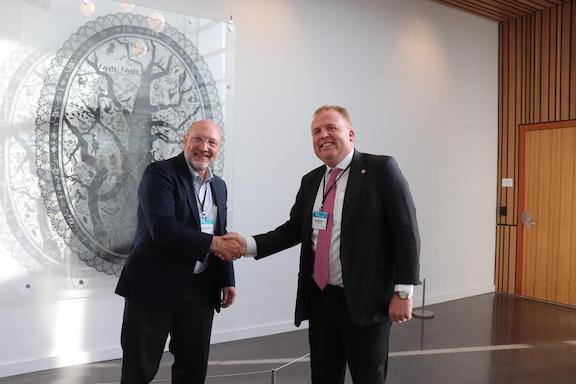Corvus Energy, the leading supplier of battery energy storage systems (BESS) for marine applications, is pleased to announce that the company is expanding its US operations by opening a new factory in the state of Washington.
The US-based manufacturing facility, with an annual capacity of 200 MWh of stored energy capacity, will support demand for marine BESS in the Americas as the marine industry accelerates its adoption of decarbonization technology to meet global GHG emissions reduction targets.
Geir Bjørkeli, CEO of Corvus Energy explains, “We have seen a significant uptake in orders from the US market as well as a growing commitment from the government and industry players on reducing GHG emissions. Increased capacity and production flexibility will be key to meeting anticipated growth. The US factory, along with a more robust sales and service organization, will ensure that we can meet American shipowner’s goals and market demand, providing better services to the US maritime industry.

“Washington State was a natural choice for Corvus due to the presence of a strong maritime cluster, the state’s focus on green shipping, and the proximity to our large team near Vancouver, Canada,” Bjørkeli remarks. “We know that a US presence and close collaboration with shipyards, shipowners, Washington Maritime Blue and other suppliers and service providers foster innovation across the entire industry and build valuable competence. This will work as an accelerator to create local, green jobs.”
The new US factory will be located just north of Seattle in the Port of Bellingham.
The announcement of the signed agreement with the Port of Bellingham was celebrated in advance of the Nordic Innovation Summit in Seattle, WA, attended by the Washington State Chamber of Commerce and Norwegian ambassador Anniken Krutnes.
Washington Governor Jay Inslee comments, “Congratulations to the Port of Bellingham and Corvus Energy on the new facility here in Washington. Corvus continues to thrive as a global leader in the sustainable transition of the maritime industry and I am pleased that they’ve chosen Washington as their first location in the US. This is a great chapter in the ongoing partnership between Washington and Norway on combatting climate change and bringing to reality the green jobs of the future.”
Corvus Energy is a multi-national operation with a strong presence in the fastest-growing markets for maritime decarbonization technology. Corvus has existing battery factories in Bergen, Norway and in Richmond, British Columbia, Canada, and a sales and service network serving Europe, North America and Asia. With Corvus’ factory and world-renowned battery R&D team nearby in Richmond, British Columbia, the new US-based factory, as well as expanding US sales and service team, have access to expertise that is unparalleled in the industry.
Forecasts predict a huge increase in demand as decarbonization pushes forward—estimating a USD 800 million market for maritime energy storage systems in 2030. Corvus is well-positioned to be an innovator and market leader in zero-emissions solutions, having amassed the largest installed base of maritime ESS—more than 600 projects and millions of operating hours.
The Corvus Energy Storage Systems are already deployed to more than 30 vessels in North America, as well as 29 hybrid port cranes and 11 land-based drilling rigs. Recently, we have seen increased demand in the tug industry and we are participating in the first all-electric tugs in both Canada and USA. The HaiSea Marine tugs will serve the LNG export terminal in Kitimat BC and the Crowley e-Wolf currently being built at Master Boatbuilders will serve the port of San Diego.
We expect continued strong growth in all market segments, in particular: offshore wind and O&G support vessels, tugs and workboats, Ro-Pax and Ro-Ro ferries, tour boats and passenger ferries, and coastal and inland cargo vessels.
Corvus estimates that over 1 billion kilograms of CO2 have already been abated from the use of our battery ESSs, and these emissions reductions will increase accumulatively as more vessel types and fleets deploy ESSs.

Follow us on social media: